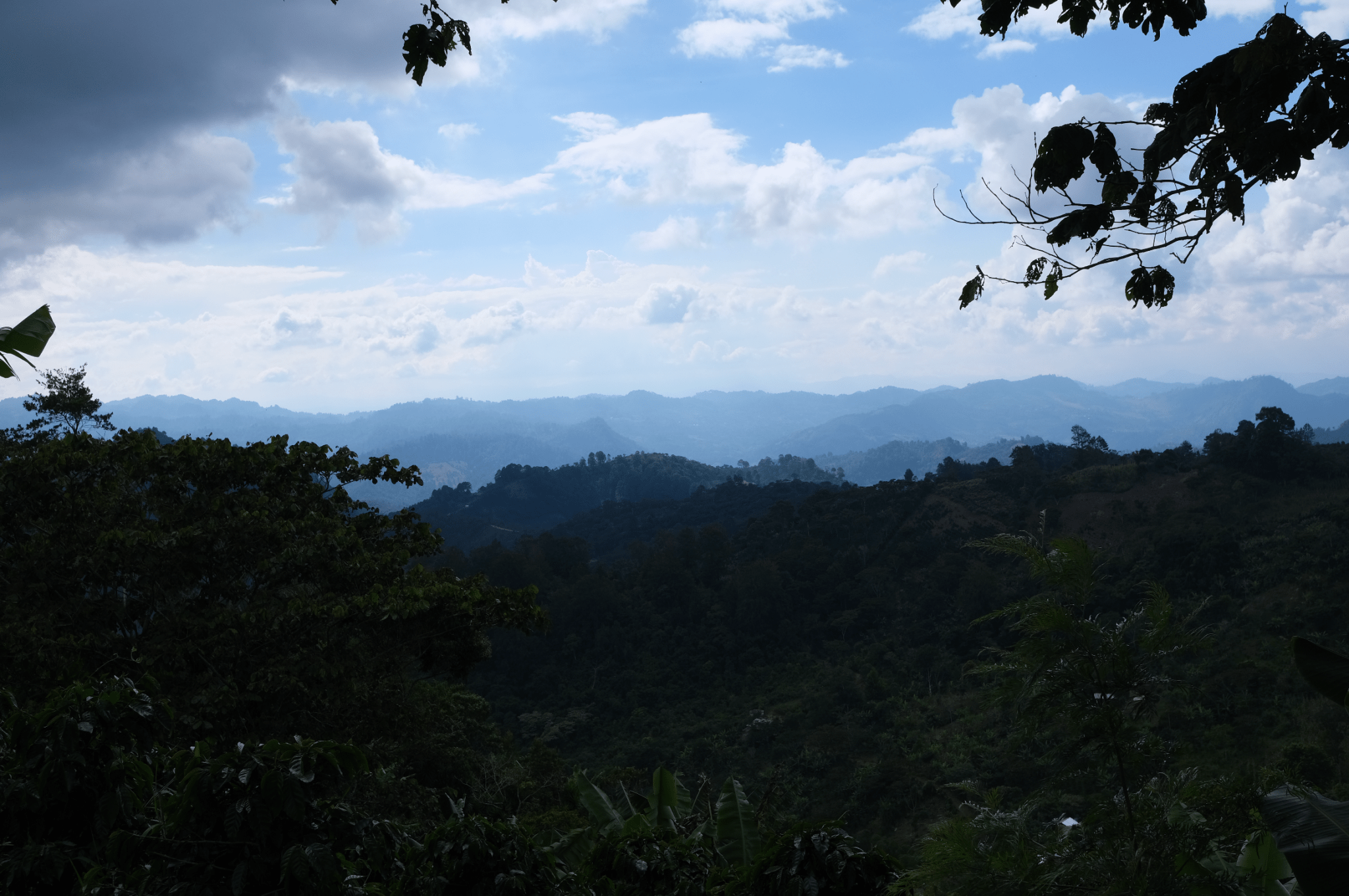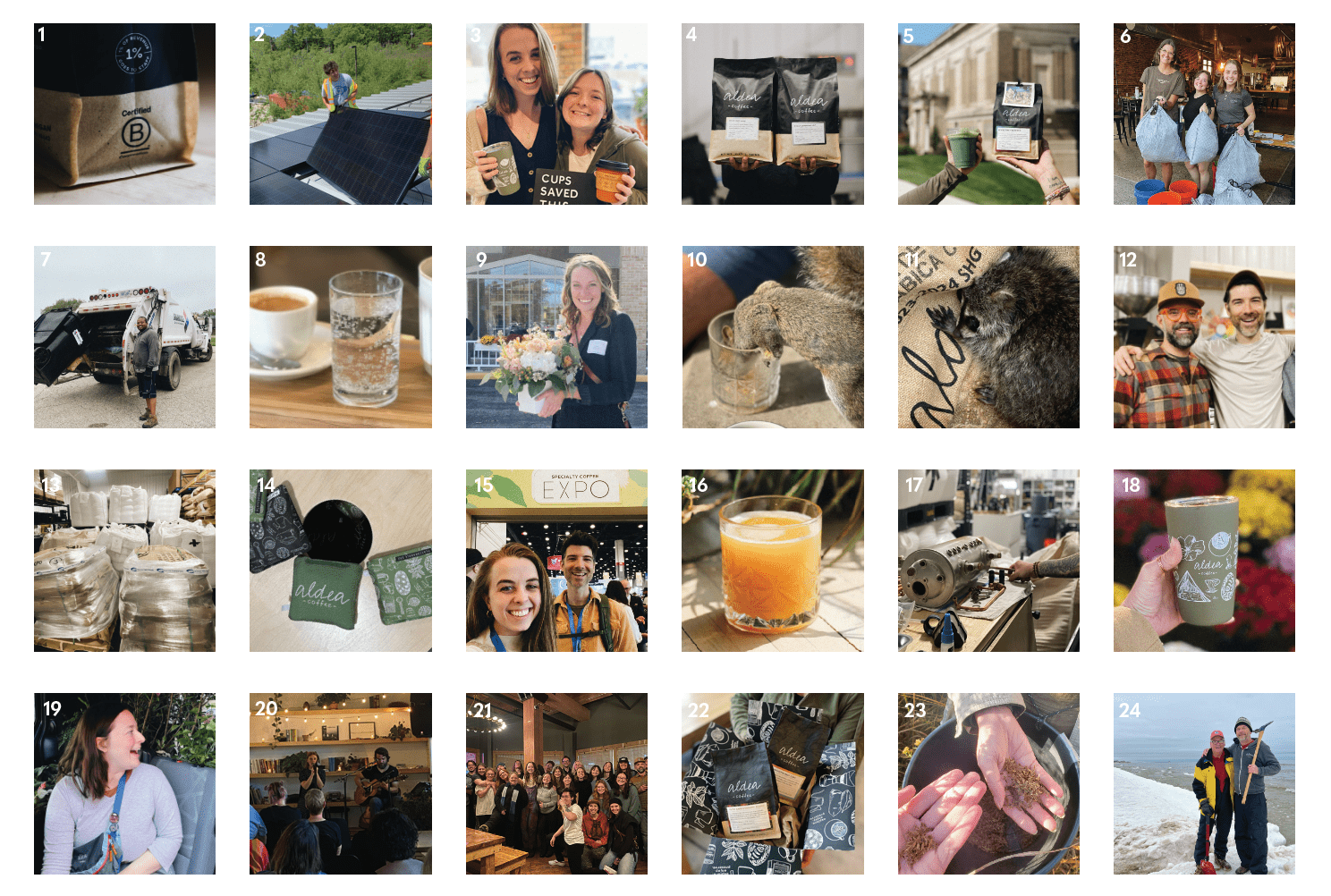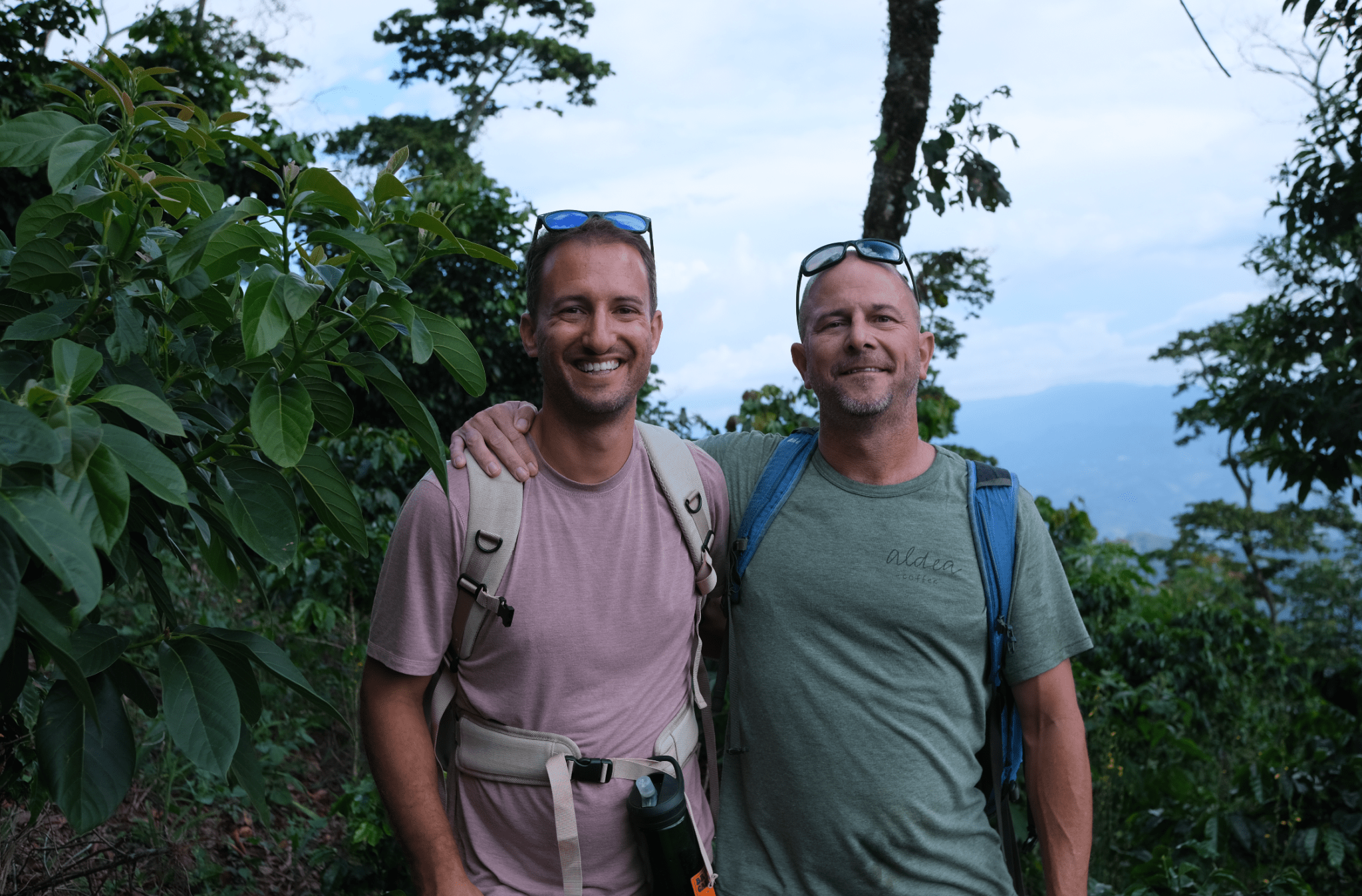Overview
- Introduction: Reflections from the Roastery
- New Coffee Releases
- New Roaster’s Pick Coming Soon
-
Feature: B Corp: Three Plus Years of Certification for Aldea Coffee
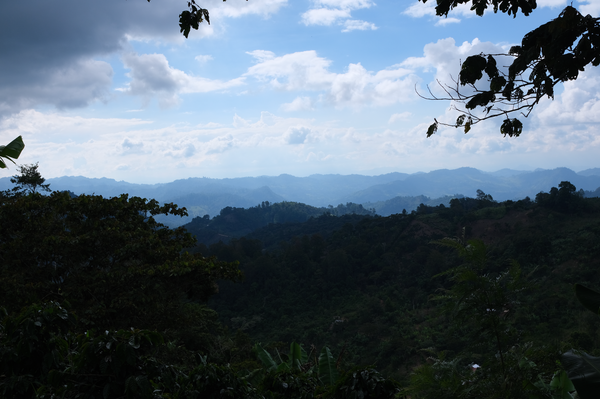
Monthly Features
Filter (Drip)
- Servelio Sanchez
- Dawn Chorus Partnership Blend
- Tanzanian AA Communal Lot
Pourover
- Ramon Enamardo
Natural processed dark roast from Honduras with notes of dark chocolate and dried berries.

Coffea Fun Fact
Despite there being over 120 species in the genus Coffea (coffee), the Specialty Coffee industry generally roasts and brews the seeds (beans) of only one: Coffea arabica.* This species and its many varieties are generally known for their acidic complexity and sweetness—notes of chocolate, fruit, and sugar—which is why they are so coveted. The name of this species is a bit misleading, however. The original designation, C. arabica, was dubbed by none other than Carl Linnaeus, the originator of plant taxonomy in 1737. At the time, it was widely thought that the species as they knew it came from the Arabian Peninsula. Although Yemen was the major trader and cultivator of C. arabica back then, the species really should have been named after its actual birthplace: the cloud forests of the Boma plateau in Ethiopia and Southern Sudan.
* This is slowly changing with Specialty-grade C. robusta—arabica’s more hardy, fuller-bodied, and more caffeinated (and therefore more bitter) cousin—becoming more available and less stigmatized.

REFLECTIONS FROM THE ROASTERY
Ready or not, spring is nigh. Purple crocuses are blooming along the road. Red-winged blackbirds are back at my feeder with a vengeance (I counted 24 yesterday morning) and have been for the last two weeks. Robins are singing and laughing in the mornings. My dog is back to digging holes in the yard. And, Jackie Pollock, our peregrine falcon friend that has been roosting above the Grand Haven café, was absent the past few weeks, which likely means it is mating season for them. It also means that the 2023-24 harvest of green coffee in Honduras is in the final stage of processing and will soon be shipped off.
As mentioned in last month’s newsletter, we had a few staff members visit La Union, Honduras, where the majority of our green coffee comes from, at the end of February. They had a chance to visit some of the coffee producers we’ve been working with for years like Gilberto Barrientos, Karolina Alvarenga, Alfredo Ponce, and Walberto Alvarado Castellanos. They also played five-a-side soccer with some locals, tried their hand at harvesting, and checked out the beneficio where the coffee is processed before shipment. It was the first time our café managers, Chloe McCallister and Jill Burrows, were able to make the trek.
“I will never just see a cup of coffee [anymore],” says Jill. “Instead, I will see a blur of all the smiling faces that did all the hard work to get it into this cup. It will taste like the love of the community that this simple little bean has so beautifully connected.”
As Jill so poetically put it: there’s nothing quite like seeing the amount of work, time, dedication, and knowledge that goes into producing a cup of coffee. And, when all the green coffee leaves port for us here in Michigan and finally arrives in all of those jute sacks, stacked floor to ceiling in the container, sometime in June, it’s hard to believe that the journey actually began with little red fruits, picked on a mountainside, sometime back in early December.
MARCH COFFEE RELEASES

Alfredo Ponce
Speaking of Alfredo—his coffee is back! Expect to see it online and on the shelves at the cafés on March 15. For the 11th year in a row, it’s yet another great harvest from Alfredo & co., with this year’s crop being particularly fragrant and fudgy. Expect complex notes of cherries, brown spice, and that fudge with this lightly roasted washed coffee.

New Roaster’s Pick: Marlon Carcamo Dark
Marlon Carcamo’s coffee has been a cafe favorite for years. Celebrating his 15th year, I’ve decided to reimagine this washed-process coffee that is typically lightly roasted and see what happens when I up the toastiness and boldness, dropping it 12 degrees darker than usual. It turned out to be a winner.
The once mellow citrus and nut give way to a rich chocolate pie, vanilla, and toasted almonds. Definitely bolder. Both are delicious in their own right, just different.
Marlon Carcamo Dark will be available alongside the typical, lighter roast profile at the cafes for a short time only, starting on March 22nd. Get it while it lasts!
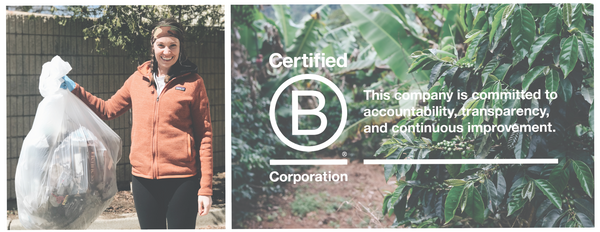
B Corp: Three Plus Years of Certification for Aldea Coffee
By Scott Dorsch
“The B stands for ‘benefit,’ and as a community, B Corporations want to build a new sector of the economy in which the race to the top isn’t to be the best in the world but to be the best for the world.”
-- Ryan Honeyman, from The B Corp Handbook: How You Can Use Business as a Force for Good
Ben & Jerry’s, Patagonia, Allbirds, King Authur Flour, Stonyfield Farm, New Belgium Brewing, Brewery Vivant, Cabot Creamery, Seventh Generation, Klean Kanteen, Cascade Engineering, Dr. Bronner’s, Eileen Fisher, Kickstarter, and for three years and counting, Aldea Coffee.
Perhaps you’ve seen that giant B on the side of our coffee bags or printed on the window at our cafes and thought: Why the heck would you be so excited about getting a B on your business report card? Perhaps you just thought we liked the organic shape of Bs. Or, maybe you recognized it for the cool thing that it represents: “the highest standard for socially responsible businesses,” according to Inc. Magazine.
Joining thousands of other purpose-driven businesses in over 80 countries worldwide, Aldea Coffee became a B Corporation, or “Benefit Corporation,” in September 2020 and successfully recertified in December 2023. Not only did we recertify as is required every three years by B Lab Global, the nonprofit organization that administers the certification and sets the standards), but we also boosted our B Impact Score by 30 points--improving from 83 to 113.
An awesome accomplishment in many ways but this is just the beginning, says co-owner of Aldea Coffee, Jeremy Miller.
“Sure, getting certified is great in that it provides validation,” says Jeremy, “but the true value . . . is holding ourselves to the standards in the audit. B Corp Certification is a journey, not a destination.”
The “audit,” as described by Jeremy, is an intensive process known as the B Impact Assessment. This assessment’s purpose is twofold:
1) to evaluate a company’s impact on their employees, customers, environment, community, and suppliers for purposes of certification; and
2) a free, online tool to help businesses understand their environmental and social impact, quantify it, and then offer guidance on ways to improve these aspects of their business. To give you an idea, the median score of an “ordinary business” is 50.9, according to B Lab Global. A score of 80 is required for certification.
The B Impact Assessment is a long process that can take nearly 1-3 years to complete and requires hard data and evidence to back up any claims made by the certifying business. Despite this challenge, Jeremy and his business partner, Andrew Boyd, agree it’s a worthwhile process and investment.
“[The B Impact Assessment] has become incredibly valuable . . . It has helped us tweak our handbooks, organize our finances, track our sourcing, and evaluate basically everything we do,” says Aldea co-owner, Andrew. “I’m not actually sure where we would be without it.”
“The greatest tool B Corp provided was the process,” says Jeremy.
One of the lead coordinators of the B Corp certification process at Aldea Coffee was Operations Manager, Brittany Goode. With the help of colleagues, an intern, lots of spreadsheets, and tea (Yeah, she’s not much of a coffee drinker but we still love her.), Brittany documented all she could to prove Aldea’s claims on the assessment.
“I am so obsessed with this particular project that immediately after receiving our score in 2020, I couldn’t wait to get started [on] . . . recertification. I would find myself going through the assessment every free moment I had,” says Brittany.
The score wasn’t what drove Brittany, however. Sharing sentiments with Andrew and Jeremy regarding the B Corp assessment, it is a “guideline” to her, it means more than “points”:
“It means being a part of a community that [is] working towards a sustainable future.”
Sustainability is a key part of Aldea’s mission and the mission of B Lab Global as well. And in more than one way. Environmental sustainability is an important piece to the puzzle, but so is financial sustainability and social sustainability for the communities in which businesses, well, do business.
“At its highest potential, it is an economic revolution,” says Andrew Boyd. “[B Corp] creates a system in which businesses . . . can address some of our biggest societal needs. It redefines what profit is and forces us to assign value to the environment and . . . a living wage just as much as making every dollar we can. Imagine if Amazon saw profit as well-paid, healthy employees instead of just billions of dollars.”
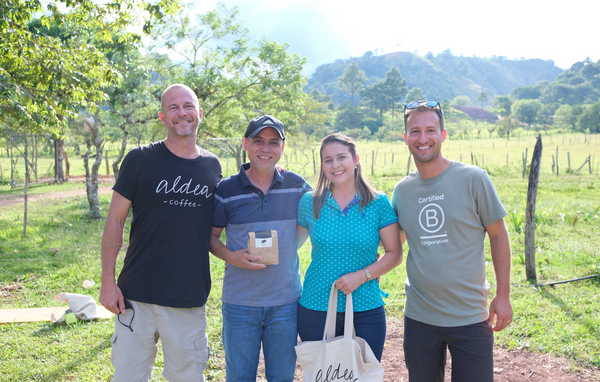
Behind the B Impact Assessment Score
Okay, this all sounds great, but what are some specifics?
Here’s a quick highlight reel of the things we do as a Benefit Corporation:
- Our nonprofit, Aldea Development, provides microfinancing options, free specialty coffee training, and facilitates and funds clean water and air projects for the community of La Union, Honduras, where we Direct Trade more than 80% of our green coffee
- Give 2% of total revenue back to origin to support coffee farmers
- Pay our employees a minimum rate of $15/hour, offer PTO, revenue shares, and wellness stipends
- Heavily vet all of our suppliers, ensuring they have a solid social and environmental track record. This includes our green coffee and tea, the products that go into our house-made syrups and baked goods, and to-go products that are all either 100% recyclable or compostable.
- Work with small, local vendors (within a 50-mile radius whenever possible), such as Laughing Tree Bakery, Hudsonville Honey, KSB Maple Syrup, Crisp Country Acres, BBC Distributing, Health Hutt, Country Dairy, Lavender Hill Farm, Patricia’s Chocolates, Love’s Chocolate, French Paper Company and more.
- Incentivize community involvement with paid volunteer time for our staff
- Partner with local farmers to dispose of our compostable waste
- Partner with the City of Grand Haven and Muskegon for community events such as beach cleanups
Interested in learning more? One of the great things about B Corps (and supporting them) is their level of transparency. If you want to view our B Impact Score and its breakdown, you can do so at bcorporation.net (or follow the link here).
And, if you want to learn more about how we do ethical coffee, be sure to subscribe to our email list to receive content like this as it happens.
As always, thanks for reading.

Resources:
- Honeyman, Ryan and Tiffany Jana. The B Corp Handbook: How You Can Use Business as a Force for Good. Berrett-Koehler Publishers. 2019.
- B Lab U.S. & Canada, usca.bcorporation.net/.
